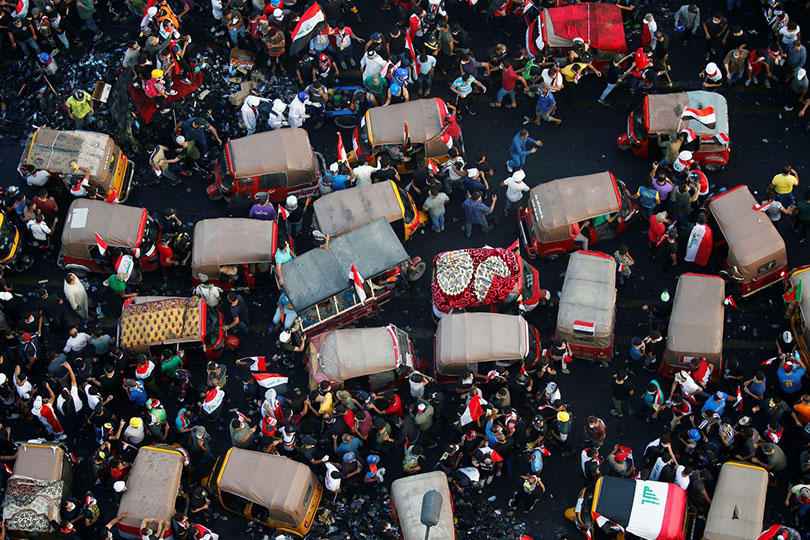Iraqis have until recently considered the humble motorcycle rickshaw, or tuk-tuk, the degrading ride of the underclass compared with the more respectable, and expensive, yellow taxi. Tuk-tuks were relegated to the poorest parts of the capital, Baghdad, while members of Iraq’s wealthy political class commanded the streets in their coveted Land Cruisers.
Suddenly, there’s nothing cooler in Iraq than to be a tuk-tuk driver — one of the valiant and honorable men risking their lives as they whiz through tear gas and bullets to rescue injured protesters and ferry them free of charge to hospitals or ambulances that cannot reach the crowds.
More than 200 Iraqis have died and thousands more have been injured in the anti-government protests, which have been fueled by poverty, rampant corruption, unemployment and crumbling public services. Iraq’s once-marginalized tuk-tuk drivers — symbolic of how hard life had become for average Iraqis — have been front and center, keeping the movement, literally, alive.
New graffiti around Baghdad has crowned it “the tuk-tuk revolution.” A popular Iraqi singer, Hussam Alrassam, penned a patriotic ode to the protests and tuk-tuk drivers, describing them as heroes in a video intermixed with images of demonstrators and tuk-tuks in action.
The tuk-tuk may look like a toy, but it’s doing damage like a tank, goes one protest chant. In another video circulating online, young female protesters cheer as they come upon a slim tuk-tuk driver. Overcome with emotion, he starts to cry.
In Baghdad’s Tahrir Square, volunteers hand out food, drinks, power banks and gas masks — and tuk-tuk drivers are now given priority. Just weeks ago, these young men were struggling to make even $20 a day on the job.
Tuk-tuks came to Iraq just in the past few years as a response to rising congestion and as a cheaper alternative to taxis. The motorized rickshaws had been largely used just in Sadr City, one of Baghdad’s biggest and poorest neighborhoods. Tuk-tuks can easily navigate the area’s narrow and unpaved roads.
In Baghdad’s Tahrir Square, volunteers hand out food, drinks, power banks and gas masks — and tuk-tuk drivers are now given priority. Just weeks ago, these young men were struggling to make even $20 a day on the job.
Tuk-tuks came to Iraq just in the past few years as a response to rising congestion and as a cheaper alternative to taxis. The motorized rickshaws had been largely used just in Sadr City, one of Baghdad’s biggest and poorest neighborhoods. Tuk-tuks can easily navigate the area’s narrow and unpaved roads.
Karrar Hussein, a 17-year-old tuk-tuk driver from Sadr City wearing dirty and tattered clothes, said he has been in the streets of Baghdad since the first day of protests and does not care about the risks.
“I am here to do my part in this revolution,” he said. “We felt that we are needed, and we answered the call.” On Saturday, he was hit in the leg by a tear-gas canister; nonetheless, he rushed an injured protester to an ambulance and then dealt with his wound before heading back out, he said.
“I am happy that we are finally getting the respect we deserve, because eventually we are all humans,” he said. “I didn’t like the way people were looking at me before, but now this all has changed. It’s a revolution against everything wrong, including the way we were seen.”
Hussain Ali, a 19-year-old tuk-tuk driver also from Sadr City, wore dirty clothes and a gas mask as he proudly described his work ferrying injured protesters. “These people are demanding my rights to have a decent life; this is the least I can do,” he said. “I don’t care about being in the middle of death. All I care about is not letting those people down who are counting on us. I feel really happy while driving to the fronts because I feel that I am doing a big thing.”
Much remains unknown about how Iraq’s protests will develop. In the meantime, tuk-tuk drivers have made their mark on this history.
Sama Razzaq, a 22-year-old medical student providing first aid in Baghdad’s Tahrir Square, acknowledged that at first she “hated” seeing tuk-tuks in the capital, as she thought they “were distorting the shape of our city.”
“But now, no,” she continued. “They are the flowers of our city. They proved how wrong and shallow we were. They are the real heroes, and I apologized to them. I am honored to ride one now. I feel like a queen.”







Comments